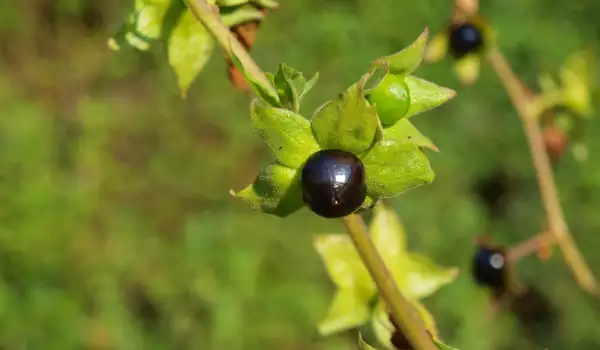Belladonna / Atropa belladonna /, also known as Deadly Nightshade, is a perennial herb with thick white roots. Its leaves are dark green with an irregular shape. The fruits of belladonna are black, reaching a diameter of 0.4″ (1 centimeter). Belladonna is found throughout Europe, North Africa and parts of Asia.
Belladonna is a shrub that you may encounter in the mountains, hidden in damp, shady spots. Belladonna blooms during the months of May to September into beautiful purple flowers. Belladonna is an herb included in the Red Book of Endangered Species.
History of belladonna
Belladonna has been known since ancient times. Its Latin name (Atropa belladonna) is owed to the ancient Greek goddess Atropos. She is one of the three goddesses who guide the various stages of the fate of man. The goddess Atropos is responsible for death, and in large quantities the herb is deadly, hence the name. In Babylon and Egypt, women used belladonna to dilate their pupils, believing it made them more beautiful.
Decoctions of the leaves of belladonna were some of the most common poisons used by the Romans. A Roman woman named Locusta was often hired to kill women who could no longer satisfy their husbands. She had even killed emperor Claudius, and when she was captured, was found to be carrying belladonna.
During the Middle Ages, people realized that the herb had a beneficial effect as long as it was not overused. In the beginning, it was used as an excellent anesthetic during surgery and later, in the treatment of Parkinson’s disease. Nowadays, belladonna has entered modern medicine as a proven drug for various conditions.
Composition of belladonna
The plant contains tropane alkaloids, 1.2% in the leaves and up to 1.3% in the roots. Highest in content are atropine, coumarins (scopoletin, umbelliferone), glycosides, tannins, and others.
Selection and storage of belladonna
Belladonna is an herb that should not be collected because it is in the Red Book of Endangered Species. Furthermore, this herb is dangerous to human health and improper use can lead to death. Supplements containing it should be used only under medical prescription. Belladonna is available as a standard extract, ointment, tincture and suppository.
Benefits of belladonna
Belladonna has a very good antispasmodic action, is used for dilation of the pupils. The herb relieves pain and inflammation. In the form of lotions and ointments, it can be used to treat sciatica, gout, neuralgia and rheumatism.

Administered in small doses, it alleviates heart palpitations, is used for intestinal colic, pneumonia, spastic asthma. It acts as an analgesic for smooth muscle spasms of the gastrointestinal tract - gastritis, ulcers, and uterine cramps. The herb inhibits saliva and gastric secretion.
Belladonna helps with insomnia and has the effect of a painkiller. In homeopathy, it is used for meningitis, fever, tonsillitis. Tinctures of belladonna are used as powerful relaxants.
The root of the herb is used for the treatment of problems of the liver and gall bladder, congestive heart failure, arrhythmia.
Dangers of belladonna
As already noted, belladonna is a dangerous herb that can be deadly if misused. Therefore, belladonna should be prescribed in small doses by a doctor or homeopathist, making sure that the prescription is strictly adhered to. In rare cases, belladonna is taken by itself, but mostly it is combined with other herbs.
Overdose of belladonna causes a sharp rise in temperature, dry mouth and severe thirst. It is not uncommon to experience seizures and hallucinations. Specific signs of poisoning are loss of voice and pupil dilation, continuous shaking of the hands and feet. When such symptoms are apparent, the person must immediately be taken to the emergency room, where doctors will perform gastric lavage.
The deadly nature of the belladonna poison is due to alkaloid atropine, which it contains. The root is the most poisonous while the fruit is least poisonous.







